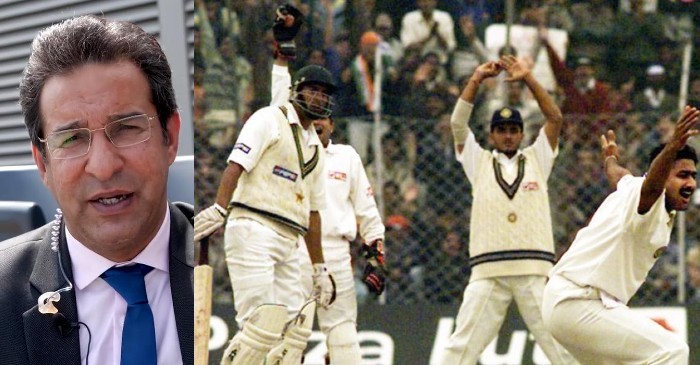The legendary Wasim Akram was one of the finest fast bowlers the cricketing world has ever seen. The left-armer finished his international career as the highest wicket-taker for Pakistan in both Test and ODI formats. He earned 414 scalps in red-ball cricket, while 502 in the white-ball set-up.
Akram had seen the golden times of Pakistan when it used to dominate other teams, especially the arch-rivals India. However, there had been few occasions when Akram was on the receiving end, and one such moment was the 1999 Test at the Feroz Shah Kotla in New Delhi, when Pakistan lost to India by 212 runs, thanks to Anil Kumble’s historic 10-wicket haul in an innings.
While recalling the famous episode, Akram spoke to former Indian opener Aakash Chopra on his official YouTube channel and dropped his opinions. The former Pakistani skipper revealed that he didn’t want to become the 10th victim of Kumble and had asked Waqar Younis, who came at number eleven, to throw his willow around while facing Indian pacer Javagal Srinath.
However, it couldn’t happen, as Kumble got Akram in the end and became just the second bowler to scalp ten wickets in an innings of a Test match.
“No. This is against sportsman’s spirit (desperately getting out another bowler). I said to Waqar Younis that you play Anil Kumble, I will not get out to him. As a captain, I told Waqar to play his normal game and go for shots against (Javagal) Srinath. The first ball Kumble bowled… inside edge…and I got caught. It’s a big day for India and Kumble. It was massive,” said Akram.
During the game, the Mohammad Azharuddin-led side set Pakistan a target of 420 runs in the match, but the visitors were bundled out for 207, and, thereby, lost the contest by 212 runs. Kumble finished with the bowling figures of 10-74 from 26.3 overs.
Before the Indian leggie, Jim Laker was the first bowler to get a 10-wicket accomplishment in an innings of a Test against Australia way back in 1956. There had been some who came close to this achievement by picking nine scalps, like Muttiah Muralitharan, Rangana Herath and Keshav Maharaj.
